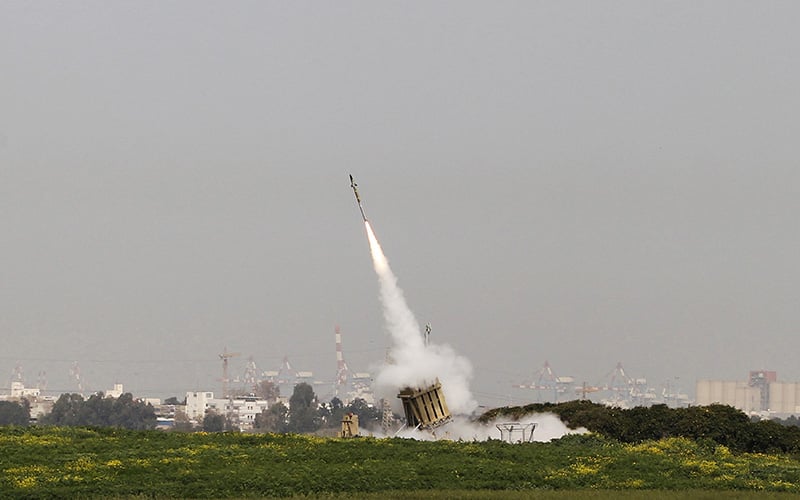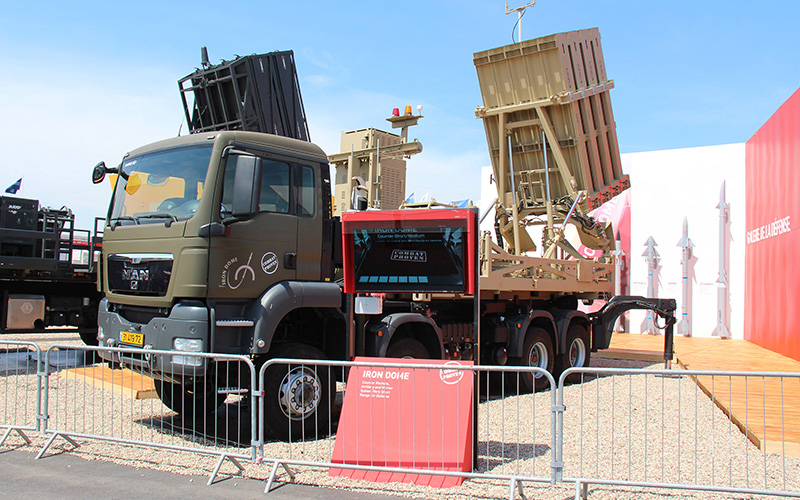
An Iron Dome battery launches a rocket to intercept a missile near Ashdod, Israel. (Photo courtesy of Raytheon)

Each Iron Dome battery can defend up to nearly 60 square miles. (Photo courtesy of Raytheon)
PHOENIX – Amid recent violence in the Middle East, Arizona Gov. Doug Ducey tweeted “Arizona stands with Israel,” joining Republican leaders across the country in a show of political support.
It also provoked outrage among those who support Palestinians, with one activist calling Ducey’s position a “violation of human rights.”
Despite the polarized viewpoints, Arizona’s aerospace and defense industry not only “stands with” Israel, but technology developed here stands watch over the country: Israel’s Iron Dome defense system was created here. In partnership with Rafael Advanced Defense Systems in Israel, Raytheon Missiles & Defense in Tucson produced the anti-missile defense system credited with blocking thousands of missiles fired by Hamas and other groups since it was first deployed in 2011.
Raytheon employs 15,000 Arizonans, according to its spokesperson, and Israeli partner Rafael formed a joint venture last year to build a version of the Iron Dome for use in the United States.
Leib Bolel, president and CEO of Arizona Israel Technology Alliance, said that when the U.S. provides military aid to Israel, it’s primarily in the form of government contracts.
Raytheon and Rafael “work very closely with the Israeli government to supply them with a number of military applications, but most notably is the Iron Dome,” Bolel told Cronkite News. The midair interception technology came “out of Rafael and Arizona, so there’s a lot of military collaboration between the two governments.”
The Iron Dome is a short-range anti-rocket system, with an intercept range of 2.5 to 43 miles, and has been relied on during the recent conflict. A shaky ceasefire remained in place Monday, but the Associated Press reported Israel launched airstrikes on the Gaza Strip late last week.
Last month, clashes escalated between Palestinians and Israeli police when Israel tried to block some Muslims gathering at al-Aqsa Mosque in Jerusalem’s Old City at the beginning of Ramadan, the AP reported. Tensions over a plan to evict dozens of Palestinians from an east Jerusalem neighborhood also fueled confrontations.
Israeli airstrikes on Gaza caused the majority of casualties. According to human rights officials at the United Nations, as of May 27, the conflict had killed at least 256 Palestinians and injured nearly 2,000. The UN Office for the Coordination of Humanitarian Affairs said that 72,000 Palestinians were displaced as a result of the IDF strikes. At least 12 Israelis were killed and Israeli officials reported at least 200 injured, according to the BBC.
The Iron Dome is credited with more than 2,500 intercepts and a success rate exceeding 90%, according to Raytheon’s spokesperson. According to the Israel Defense Forces, more than 4,300 missiles were launched toward Israel just during the latest conflict in May.
Alleging that the al-Jalaa Building housed Hamas and anti-Iron Dome research, Israel targeted an airstrike to the building during last month’s conflict, which housed offices for the Associated Press, Al Jazeera and other media in Gaza City. Israeli officials have since rolled back some of their early accusations, and the AP has denied there was any indication of Hamas in the building.
Dramatic images from the recent conflict show the Iron Dome intercepted many of them, by targeting and destroying incoming projectiles. The system had faced earlier tests, with conflicts in 2012 and 2014. In 2012, Israeli officials said the Iron Dome intercepted 85% of more than 400 rockets fired by Gaza-based militants, according to a congressional report. Subsequent upgrades improved the Iron Dome’s interception rate to close to 90% in 2014, the report said.
Israel Was Slammed For Bombing Gaza Building That Housed AP. But Israel Says Hamas Was Building Anti-Iron Dome Device There. https://t.co/3E47Mx4qIW pic.twitter.com/Ei44bFLO6r
— The Daily Wire (@realDailyWire) June 9, 2021
The Iron Dome is also being implemented in the United States — though any plans for where and how it will be deployed have not been made public yet. In 2019, Israel Ministry of Foreign Affairs says the U.S. Defense Department signed an agreement to purchase two Iron Dome batteries for the U.S. Army, which were delivered earlier this year.
Political and economic support of Israel
Raytheon has worked with Rafael for more than a decade on the Iron Dome. As of 2019, the U.S. had spent $1.6 billion on Israel’s Iron Dome, according to the Congressional Research Service.
In addition to manufacturing the Iron Dome for Israeli defense, Raytheon and Rafael have co-developed the David’s Sling Weapon System, “an element of Israel’s multi-tier layered missile defense architecture that provides midtier regional defense against tactical ballistic missiles, medium- to long-range rockets, aircraft, drones and cruise missiles,” according to Carolyn Beaudry, communications manager for Raytheon’s land warfare and air defense program.
Raytheon declined to answer whether the recent conflict in Israel increased interest in the company from other countries. In the last three-month period, the company’s stock price has increased 9.65%. In the first quarter of 2021, Raytheon made $11.6 billion in product sales, according to Securities and Exchange Commission filings.
Arizona stands with Israel. ????
— Doug Ducey (@dougducey) May 12, 2021
Three years ago the Arizona Chamber of Commerce & Industry and the U.S.-Israel Business Initiative signed a memorandum of understanding pledging to work together to strengthen the economic and commercial ties between Arizona and Israel. The two organizations agreed to collaborate on water, fintech, technology and startups, defense and aerospace.
According to the Arizona Commerce Authority, Arizona exports to Israel $235 million in aerospace products and parts, $43 million in basic chemicals, and $40 million in semiconductors and other electronic components. When Ducey opened Arizona’s first trade and investment office in Israel in 2019, media reported Arizona was Israel’s ninth-largest trading partner. The Governor’s Office declined an interview request from Cronkite News on the subject of trade with Israel.
More than 90 Arizona companies do business in Israel, including Gilbert Engineering, White Microelectronics, Burr Brown, Ace Aviation and Litton Systems, according to the American-Israeli Cooperative Enterprise. Since 1996, Arizona companies have received nearly $880 million in foreign military financing, including Aeromaritime America Inc. in Mesa, Asfir Inc. in Scottsdale and International Turbine Engine in Phoenix, according to the enterprise.
Patrick Ptak, the Arizona Commerce Authority’s senior vice president of executive initiatives, told Cronkite News, “we have not seen a disruption in trade or economic collaboration with Israel recently.”
The U.S. annually provides Israel $3.3 billion in Foreign Military Financing and $500 million for cooperative programs for missile defense, according to the Department of State.
President Joe Biden has promised U.S. support to help Israel replenish its Iron Dome defense system, which requires continued funding and ammunition.
“I also emphasized what I said throughout this conflict: The United States fully supports Israel’s right to defend itself against indiscriminate rocket attacks from Hamas and other Gaza-based terrorist groups that have taken the lives of innocent civilians in Israel,” Biden said May 20.
Controversy surrounds Iron Dome
In the days after Ducey tweeted support for Israel, demonstrators held a rally at the Arizona Capitol to demand freedom for Palestine and an end to the violence.
Protesters are marching down 17th Avenue on sidewalks chanting “Free free Palestine” – this looks like one of the largest protests I’ve seen in Phoenix since last year’s Black Lives Matter demonstrations. @azcentral pic.twitter.com/KCIYHfpzw2
— Audrey Jensen (@Audreyj101) May 15, 2021
Activists disagree on the value of the Iron Dome – some say it’s a vital tool, others say its use prolongs conflict.
Mohyeddin Abdulaziz, spokesperson and volunteer with the Arizona Palestine Solidarity Alliance, said one of the biggest problems in the Israeli-Palestinian conflict is that the U.S. unconditionally supports Israel. Abdulaziz believes this prolongs the conflict.
“It gives no incentive for Israel to negotiate a peaceful and just resolution,” Abdulaziz said, adding that Ducey’s position supporting Israel “is in violation of international law, it’s in violation of the Geneva Convention, in violation of human rights.”
The U.S. and the international community ignore the United Nations’ rules by continuing to trade with occupational settlements, Abdulaziz said, noting that the UN has made rules for recognizing Palestinian rights regarding settlements but they go unheeded.
Pro-Israeli activists say the Iron Dome technology is vital.
“We wish the Iron Dome weren’t necessary and that Israelis and Palestinians could live and thrive in peace,” said Roz Rothstein, co-founder and CEO StandWithUs, an international, nonpartisan Israel education organization. “One of the main reasons (Hamas) have failed in their attempts to murder thousands of Israelis is the Iron Dome, a technology developed through crucial cooperation between Israel and the United States.”
